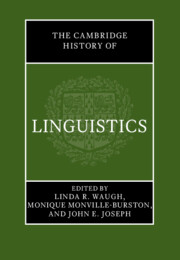Book contents
- The Cambridge History of Linguistics
- The Cambridge History of Linguistics
- Copyright page
- Dedication
- Contents
- Figures
- Tables
- Contributors
- Preface
- Acknowledgments
- Abbreviations, Acronyms, Special Symbols, and Other Conventions
- Introduction
- Part I Ancient, Classical, and Medieval Periods
- Part II Renaissance to Late Nineteenth Century
- Introduction to Part II The Cultural and Political Context of Language Studies from the Renaissance to the End of the Nineteenth Century
- 7 Universal Language Schemes
- 8 Locke and Reactions to Locke, 1700–1780
- 9 Rousseau to Kant
- 10 The Celebration of Linguistic Diversity: Humboldt’s Anthropological Linguistics
- 11 Early Nineteenth-Century Linguistics
- 12 The Neogrammarians and their Role in the Establishment of the Science of Linguistics
- Part III Late Nineteenth-through Twentieth-Century Linguistics
- Part IIIA Late Nineteenth Century through the 1950s: Synchrony, Autonomy, and Structuralism
- Part IIIB 1960–2000: Formalism, Cognitivism, Language Use and Function, Interdisciplinarity
- References
- Index
8 - Locke and Reactions to Locke, 1700–1780
from Part II - Renaissance to Late Nineteenth Century
Published online by Cambridge University Press: 20 July 2023
- The Cambridge History of Linguistics
- The Cambridge History of Linguistics
- Copyright page
- Dedication
- Contents
- Figures
- Tables
- Contributors
- Preface
- Acknowledgments
- Abbreviations, Acronyms, Special Symbols, and Other Conventions
- Introduction
- Part I Ancient, Classical, and Medieval Periods
- Part II Renaissance to Late Nineteenth Century
- Introduction to Part II The Cultural and Political Context of Language Studies from the Renaissance to the End of the Nineteenth Century
- 7 Universal Language Schemes
- 8 Locke and Reactions to Locke, 1700–1780
- 9 Rousseau to Kant
- 10 The Celebration of Linguistic Diversity: Humboldt’s Anthropological Linguistics
- 11 Early Nineteenth-Century Linguistics
- 12 The Neogrammarians and their Role in the Establishment of the Science of Linguistics
- Part III Late Nineteenth-through Twentieth-Century Linguistics
- Part IIIA Late Nineteenth Century through the 1950s: Synchrony, Autonomy, and Structuralism
- Part IIIB 1960–2000: Formalism, Cognitivism, Language Use and Function, Interdisciplinarity
- References
- Index
Summary
The relationship between language, thought, and reality was a topic of intense discussion among eighteenth-century philosophers, the source of which was Locke’s Essay Concerning Human Understanding. The author argues that Locke’s empiricism created a tradition of study due more to the philosopher’s inaccuracies/contradictions than to his correct insights. For Locke, humans are born without innate ideas and their knowledge is determined by experience derived from perception. He wanted to cancel scholastic language and the belief in faculties of mind capable of directly apprehending reality: instead, the mind is a clean slate which gets imprinted with simple sensory data, becoming more complex through further experience. Initial (nuanced) reactions to his theories came from Leibniz and Berkeley. But language remained theoretically external to understanding/reason until Condillac. For him language was fundamental in the evolution of reason and research had to begin with the historical origins of language in society. Condillac’s work was extended through critiques (Rousseau, Monboddo, Maupertuis, Girard, Diderot). Some also argued that language emerged through dialogue and that meanings were developed differently by communities (relativism). Finally, conservative reactions against empiricism (Harris, Reid, Herder) reaffirmed the belief that language could not be explained without some inherent human faculty.
Keywords
- Type
- Chapter
- Information
- The Cambridge History of Linguistics , pp. 258 - 280Publisher: Cambridge University PressPrint publication year: 2023

